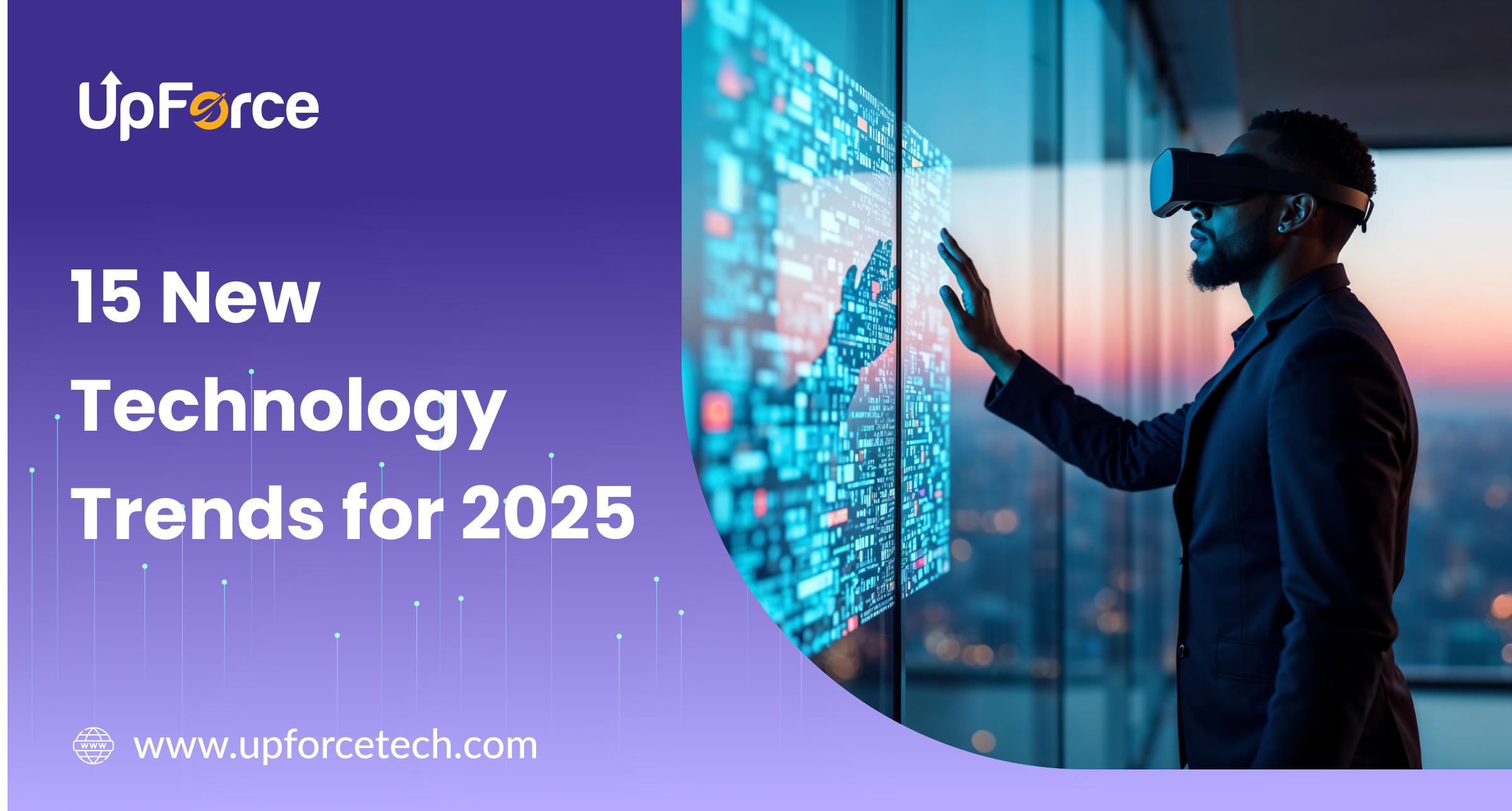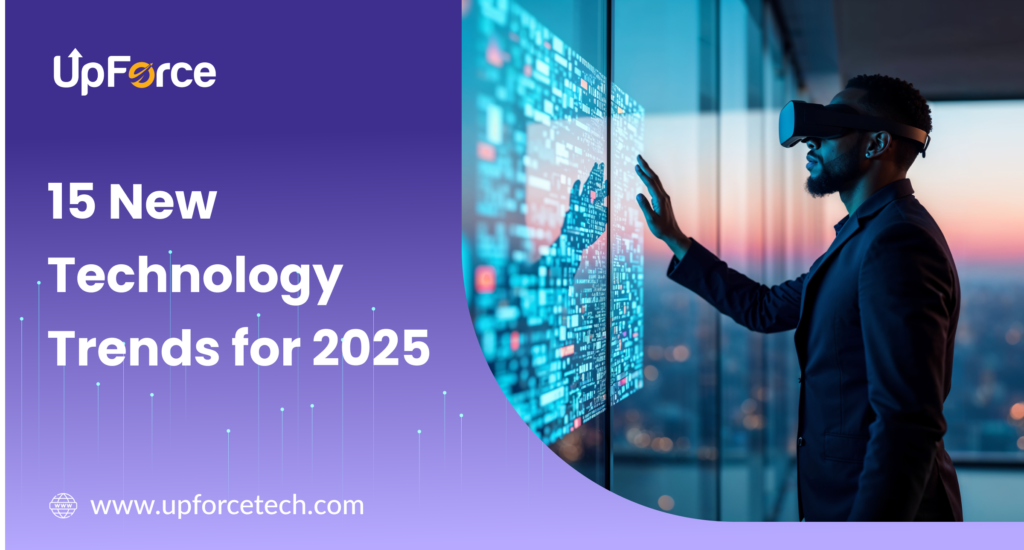15 New Technology Trends for 2025
Table of Contents
15 New Technology Trends for 2025: Shaping the Future of the IT Industry
The IT industry is always changing, with new ideas and tools transforming how we work and live. As we step into 2025, these advancements promise to make a big impact. In this blog, we’ll explore 15 technology trends that will shape 2025, especially in the IT world.

1. Smarter Artificial Intelligence (AI)
AI is becoming more useful every day. Picture a system that helps you find answers faster or tools that make customer service feel like talking to a person.
How It Helps: AI can look through lots of data to find patterns, give better shopping advice, or help businesses run smoothly.
What’s New: Tools like ChatGPT can help write emails or solve problems quickly, while other AI systems are helping in medicine and education.
Learn more about AI in simple solutions.
2. The Next Step in Quantum Computing
Quantum computing sounds fancy, but it’s all about solving big problems faster than ever before. Think about finding cures for diseases or making cars safer.
Where It’s Used: Discovering new medicines, improving how factories work, and tackling climate issues.
What’s Next: Companies like IBM and Google are making progress to make these systems more affordable and practical.
Check IBM’s work on quantum tech here.
3. The Arrival of 6G Networks
Imagine downloading a whole TV show in seconds. That’s what 6G networks promise. Beyond speed, they’ll make devices work better together.
Benefits: Instant video calls, online games without delays, and smoother virtual experiences.
Impact on IT: Industries like healthcare will see big improvements with faster data sharing.
Read about 6G’s future here.
4. More Power to Edge Computing
Edge computing helps devices process data closer to where it’s needed. For example, your smart speaker giving quick answers without sending data far away.
Where You See It: Smart homes, cars that drive themselves, and even wearable devices like fitness trackers.
Future Potential: This tech will make everyday gadgets quicker and more reliable.
Discover how edge computing makes life easier.
5. Blockchain for Everyday Use
Blockchain is more than just Bitcoin. It’s helping businesses keep records safe and trustworthy, from tracking food origins to making voting secure.
What’s Changing: Businesses are using it to make sure products are genuine or to streamline paperwork.
Why It Matters: It saves time, money, and improves trust in systems.
Explore blockchain’s benefits here.
6. Virtual Twins in Technology
A digital twin is like having a virtual copy of something real. This lets people test ideas or fix problems without touching the actual object.
Uses: Fixing machines without shutting them down or testing city designs before building.
Big Benefits: It’s safer, cheaper, and faster than experimenting with real-world items.
Learn about digital twins in cities.
7. Exciting Extended Reality (XR)
Extended Reality (XR) includes virtual reality (VR) and augmented reality (AR). Think of trying on clothes virtually or using AR glasses to learn new skills.
Where It Helps: Making online meetings more personal or guiding surgeons during operations.
What’s Next: Devices are becoming lighter and more affordable, making XR more accessible.
Discover XR’s potential here.
8. Technology That’s Good for the Planet
Green tech is about creating solutions that use less energy and reduce waste. IT is playing a big role here.
Examples: Solar-powered data centers and software that helps businesses use energy more efficiently.
Why It’s Important: Saving energy is good for both the environment and your wallet.
Find out about green tech here.
9. Systems That Run Themselves
Imagine computers that can fix their own problems. Autonomous systems can manage themselves, reducing the need for constant human input.
Examples: Networks that prevent crashes or factories that adjust themselves for better performance.
Why It’s Useful: It saves time and reduces costly errors.
Learn about how systems manage themselves.
10. Better Cybersecurity with AI
Cyberattacks are growing, but AI is helping us stay ahead. Think of software that detects and stops hackers before they strike.
How It Helps: Identifying threats quickly and protecting sensitive information.
Why It Matters: With so much of our data online, security is more important than ever.
Learn how to stay secure here.
11. Biotech and IT Working Together
Technology is working with biology to solve big problems. For example, personalized medicine that matches your unique needs.
Uses: Improving healthcare, farming, and even fighting climate change.
Why IT is Key: It helps process the huge amounts of data needed for these breakthroughs.
Explore biotech developments here.
12. Smarter Infrastructure with IoT
The Internet of Things (IoT) is connecting devices to make cities and homes smarter. Picture streetlights that adjust to traffic or sensors that spot leaks.
Where It’s Used: Smart thermostats, better traffic management, and safer factories.
Future Trends: IoT is making everyday life more efficient and connected.
Discover IoT’s impact on infrastructure.
13. AI Making Healthcare Better
AI is helping doctors diagnose problems faster and giving people better access to care. Imagine an app that tracks your health or tools that read X-rays.
Examples: Virtual health assistants and AI tools that find early signs of disease.
Why It’s Important: It improves care while reducing costs.
Read about healthcare AI here.
14. Space Tech Growing with IT
Space exploration is becoming more advanced thanks to IT. Think about satellites that monitor Earth or rockets that launch more efficiently.
Where It Helps: Tracking weather, improving communications, and even space travel for private citizens.
Why It Matters: IT makes exploring space safer and more effective.
Learn about space advancements here.
15. Advanced Robots in Daily Life
Robots aren’t just for factories anymore. They’re helping with customer service, delivering packages, and even cleaning your house.
Where They Shine: Automating boring tasks and improving how businesses run.
What’s Next: Robots will keep getting better at working alongside people.
How UpforceTech Can Help You Hire the Right Contract Developer
At UpforceTech, we specialize in connecting businesses with highly skilled contract developers who can meet their unique needs. Our rigorous vetting process ensures that you get access to the best talent, whether you need someone with expertise in front-end development, back-end systems, or mobile app development.
Here’s how UpforceTech can support your business:
- Access to a Global Talent Pool: We provide access to a diverse range of developers from around the world, ensuring you find the right fit for your specific project needs.
- Customized Hiring Solutions: Whether you’re looking for short-term contract developers or long-term project-based teams, we tailor our services to fit your requirements.
- Quality Assurance: Every developer in our network goes through a comprehensive screening process to ensure they have the necessary skills and experience to deliver high-quality work.
- Ongoing Support: Our commitment doesn’t end with hiring. We offer ongoing support to ensure a seamless integration of contract developers into your team.
For more information on how to get started with hiring contract developers, visit UpforceTech.
Are you looking to Grow your business with skilled developers? Hire a contract developer today to bring fresh ideas and expertise to your team. Learn how UpforceTech can help!
Sign up for the free Newsletter
"The technology of tomorrow begins with the innovations of today."
UpforceTech
FAQs
AI is making systems smarter and more efficient, helping with tasks like data analysis, customer service, and healthcare. It’s becoming an integral part of everyday life and business operations.
6G networks will offer even faster speeds, seamless connectivity, and better integration between devices, enabling advancements like immersive virtual experiences and instant data sharing.
Quantum computing is solving complex problems that traditional computers can’t handle, such as drug discovery, weather predictions, and optimizing industrial processes.
Green technology reduces energy consumption and minimizes environmental impact. It helps businesses save money and contributes to a sustainable future.
Blockchain enhances transparency and security in processes like supply chain management, voting systems, and verifying product authenticity.
Digital twins are virtual replicas of physical objects or systems. They help businesses test ideas, troubleshoot issues, and optimize performance without real-world risks.
IoT connects devices to provide real-time insights, improve energy efficiency, and enhance convenience, such as smart thermostats or traffic management systems.
Robots will become more intuitive and collaborative, assisting in industries like customer service, healthcare, and logistics, while also improving everyday tasks like cleaning and delivery.

